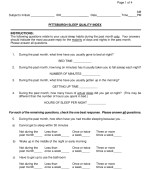 The excellent response to BMED Report’s recent review of The Big Five Inventory came as a pleasant surprise. In light of the intense reader interest, other quality psychological assessment/screening instruments that are freely available will receive occasional reviews heretofore. Healthcare practitioners, like most everyone, look for ways to save money yet to maintain the highest quality service in today’s challenging marketplace. And the Pittsburgh Sleep Quality Index (PSQI) fills this role quite nicely. Check the end of this review for links to download the free PSQI instrument along with its no-cost scoring program.
The excellent response to BMED Report’s recent review of The Big Five Inventory came as a pleasant surprise. In light of the intense reader interest, other quality psychological assessment/screening instruments that are freely available will receive occasional reviews heretofore. Healthcare practitioners, like most everyone, look for ways to save money yet to maintain the highest quality service in today’s challenging marketplace. And the Pittsburgh Sleep Quality Index (PSQI) fills this role quite nicely. Check the end of this review for links to download the free PSQI instrument along with its no-cost scoring program.
What is the The Pittsburgh Sleep Quality Index?
The Pittsburgh Sleep Quality Index (PSQI) is a freely available, brief (5 minutes), and reliable measurement of sleep quality and even includes a free scoring program (Microsoft Access required).
Why Measure Sleep?
Sleep problems commonly co-occur with anxiety, mood (especially depression and dysthymia), impulse-control, and substance abuse disorders. For example, persons with generalized anxiety disorder (GAD) are approximately three times (3x) more likely to report difficulty initiating sleep, problems maintaining sleep, and early morning awakening, and are six times (6x) more likely to experience non-restorative sleep (Roth et al., 2006). I have found it valuable to administer a pre/post sleep questionnaire whenever possible even if sleep is not an initial symptom complaint.
The Pittsburgh Sleep Quality Index Psychometrics
The PSQI (Buysse et al., 1989) is a 9-question, 19 item self-report instrument designed to measure sleep quality and disturbance over a 1-month period (Carpenter & Andrykowski, 1998). PSQI questions 1-4 request specific respondent information that is filled in by hand, such as customary bed time and length of time to fall asleep. PSQI questions 5-8 are answered on a 0-3 scale with 0 indicating no symptom presence and 3 representing symptom presence 3 or more times the past week. Question 9 is answered on a 0-3 scale with 0 meaning “very good” and 3 representing “very bad” (Carpenter & Andrykowski, 1998). All scores are combined according to the scoring criteria included with the form to produce a Global PSQI Score. Scores above 5 indicate clinically meaningfully disturbed or poor sleep.
Cronbach’s alpha coefficient produced an average internal consistency reliability estimate of .80 for the Global PSQI Score across numerous patient populations with a variety of different physical ailments (Carpenter & Andrykowski, 1998). Additionally, the PSQI is more highly correlated with sleep problems (r = .69 – .77) than with unrelated constructs, such as mood symptoms and depression (r = .22 – .65) (Carpenter & Andrykowski, 1998). Backhaus et al. (2002) reported an average Global PSQI Score test-retest reliability correlation coefficient of .87 in a group of 80 patients with primary insomnia over a test-retest interval of 2 days to 2 weeks. Additionally, Global PSQI Scores above 5 resulted in a sensitivity of 98.7% and specificity of 84.4% to persons with sleep disturbances versus controls (Backhaus et al., 2002).
Download:
Visit the University of Pittsburgh Sleep Medicine Institute to obtain the PSQI instrument, articles, and scoring program.
References:
Backhaus, J., Junghanns, K., Broocks, A., Riemann, D. & Hohagen, F., (2002). Test-retest reliability and validity of the Pittsburgh Sleep Quality Index in primary insomnia. Journal of Psychosomatic Research, 53, 737– 740.
Buysse, D.J., Reynolds, C.F., Monk, T.H., Berman, S.R., & Kupfer, D.J. (1989). The Pittsburgh Sleep Quality Index (PSQI): A new instrument for psychiatric research and practice. Psychiatry Research, 28(2), 193-213.
Carpenter, J., & Andrykowski, M. (1998). Psychometric evaluation of the Pittsburgh Sleep Quality Index. Journal of Psychosomatic Research, 45(1), 5-13.
Roth, T., Jaeger, S., Jin, R., Kalsekar, A., Stang, P., & Kessler, R. (2006). Sleep problems, comorbid mental disorders, and role functioning in the National Comorbidity Survey Replication (NCS-R). Biological Psychiatry, December, 60(12), 1364-1371.
No comments yet.